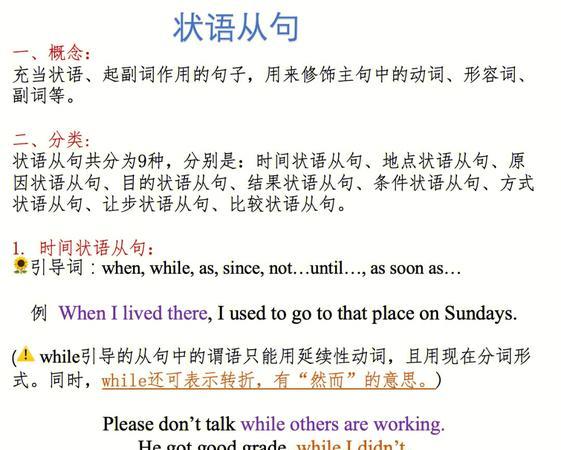状语从句是英语语法的重要组成部分,描述动作、状态或事件的时间、原因、条件和方式。时间状语从句描述事件发生的时间,如"when","while";原因状语从句描述事件的原因,如"because","since";条件状语从句描述事件发生的条件,如"if","unless";方式状语从句描述事件的执行方式,如"as","like"。掌握状语从句的用法可以使英语表达更准确、流畅。

时间状语从句
时间状语从句用来描述一个动作或事件发生的时间,常见的从属连词包括when, while, as等。例如:
- When the sun sets, the stars come out. (太阳落山时,星星出现了。)
- I was reading a book while she was watching TV. (我在读书,而她在看电视。)
原因状语从句
原因状语从句用来描述一个动作或事件的原因,常见的从属连词包括because, since, as等。例如:
- Because it was raining heavily, I stayed at home. (因为雨下得很大,我呆在家里。)
- As he was sick, he didn't go to work. (他病了,所以没去上班。)
条件状语从句
条件状语从句用来描述一个动作或事件发生的条件,常见的从属连词包括if, unless, provided that等。例如:
- If you study hard, you will pass the exam. (如果你努力学习,你会通过考试。)
- Unless it stops raining, we won't be able to go out. (除非停止下雨,否则我们不能出去。)
方式状语从句
方式状语从句用来描述一个动作或事件的执行方式,常见的从属连词包括as, like等。例如:
- She sang the song as if she was on stage. (她唱这首歌时,就像在舞台上一样。)
- He ate the pizza like a hungry wolf. (他像饿狼一样吃着披萨。)

